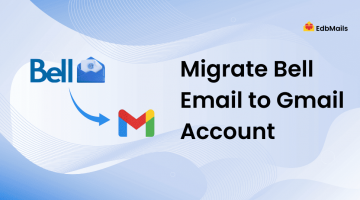Introduction
In today’s business landscape, seamless communication and reliable collaboration tools are essential for productivity. Email remains at the center of this communication ecosystem. While Zoho Mail is a well-known service, many organizations and professionals eventually look toward Microsoft Office 365 (Microsoft 365) for a more robust and scalable platform.
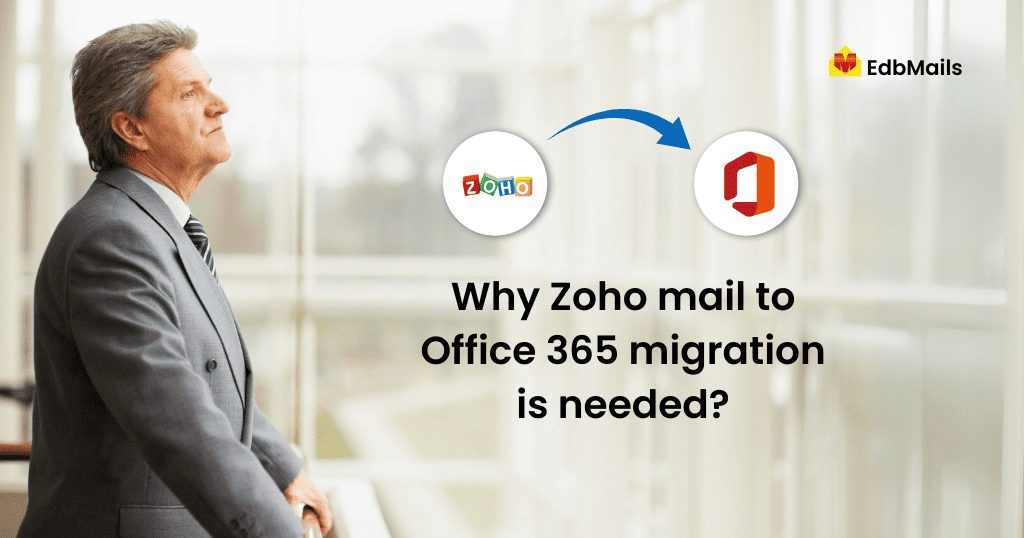
Zoho Mail is often appreciated by startups and small businesses for being cost-effective and integrated with other Zoho apps. It provides IMAP/POP access, filters, and collaboration features. However, as businesses grow, limitations become apparent. From scalability challenges to integration issues, Zoho Mail may no longer be able to keep up with the demands of larger teams or enterprises.
This is why many organizations are increasingly migrating from Zoho Mail to Office 365. Microsoft 365 is a complete suite of cloud-based productivity tools, offering not just email (via Exchange Online) but also OneDrive, SharePoint, Teams, Outlook, and the entire Microsoft Office suite. Migrating ensures that businesses benefit from advanced security, compliance, storage, and collaboration features.
That said, manually migrating from Zoho Mail to Office 365 is complex and error-prone. This is where a professional migration solution like EdbMails IMAP Migration Tool comes into play. It simplifies and automates the entire process while ensuring zero data loss, folder hierarchy preservation, and secure transfer.
In this article, we’ll explore:
- Why organizations move from Zoho Mail to Office 365
- The advantages of Office 365 over Zoho Mail
- The challenges of manual migration
- How EdbMails makes Zoho-to-Office 365 migration simple, reliable, and efficient
Limitations of Zoho Mail That Drive Migration
Although Zoho Mail provides a good entry point for email hosting, it shows its limitations as business needs evolve.
1. Difficulty Handling Large Files
Large enterprises often need to store and share extensive volumes of data. While Zoho Mail provides limited storage, it struggles to efficiently handle large attachments and bulk data transfers. Office 365, on the other hand, supports massive mailboxes with 50GB+ per user by default, expandable with archiving features.
2. Integration Challenges (Zoho Books Example)
Zoho Books is a well-regarded accounting application. However, its integration with Zoho Mail is not seamless. Without email integration, financial data workflows remain disjointed. In contrast, Office 365 provides native integration between its applications — for example, Outlook integrates seamlessly with Excel, SharePoint, and Teams, creating a connected ecosystem.
3. Poor Event and Contact Management
Zoho Mail’s calendar and contact management tools are relatively basic. Syncing across devices and attaching calendar data to emails can be problematic. In comparison, Microsoft Outlook and Teams offer enterprise-level scheduling, task management, and integrated calendars.
4. Lack of Familiarity with Non-Microsoft Systems
For professionals who have used Microsoft Office applications for decades, shifting to Zoho’s interface can be inefficient. With Office 365, users continue using familiar tools like Word, Excel, PowerPoint, and Outlook, minimizing training needs.
5. Limited Collaboration Features
Although Zoho offers collaboration, it lacks the depth and enterprise-grade capabilities of Office 365. Tools like Microsoft Teams, Yammer, and SharePoint enable real-time collaboration, co-authoring, and company-wide communication.
Why Office 365 is the Preferred Choice
Migrating to Office 365 offers organizations far more than just email. It is a complete productivity and collaboration ecosystem.
1. Access Files from Anywhere
Office 365 stores all files in the cloud through OneDrive and SharePoint, making them accessible from any device. Employees can work on documents on desktops, laptops, tablets, or smartphones.
2. Secured Cloud Storage
Security is one of Microsoft’s strongest selling points. With multi-factor authentication (MFA), encryption, and advanced threat protection, Office 365 ensures enterprise-grade data safety.
3. Improved Communication
Office 365 empowers communication through Outlook for email, Teams for chat and video calls, and Skype for Business (legacy). Organizations can conduct virtual meetings, webinars, and cross-border collaboration seamlessly.
4. Centralized Collaboration
With Teams and SharePoint, employees can co-author documents, manage projects, and share resources. Shared mailboxes, calendars, and contacts improve organizational transparency.
5. Automatic Upgrades
Office 365 constantly updates itself. Microsoft rolls out security patches and feature upgrades automatically, meaning IT teams spend less time on maintenance.
6. Integrated Business Applications
Beyond the well-known tools like Word, Excel, and PowerPoint, Office 365 includes Planner, Forms, Yammer, and Whiteboard, making it a complete workplace ecosystem.
7. Flexibility and Scalability
Office 365 offers flexible subscription plans. Whether you are a freelancer, small business, or large enterprise, you can select the plan that fits your needs. Adding or removing users is easy through the admin center.
8. Advanced Security and Compliance
Office 365 provides robust features like data loss prevention, eDiscovery, encryption, and compliance management. For industries with strict compliance needs (finance, healthcare, government), Office 365 is a trusted platform.
Challenges of Manual Migration
Many businesses attempt to move their data manually from Zoho to Office 365 through IMAP configuration or export/import methods. However, this comes with risks:
- Time-consuming and error-prone
- Risk of data loss (attachments, metadata, read/unread status)
- Limited ability to handle bulk accounts
- No incremental sync (leads to duplication or missing items)
- Requires technical expertise
This is why IT admins and organizations turn to automated solutions like EdbMails IMAP Migration Tool, which eliminates these risks.
Best Software for Zoho Mail to Office 365 Migration
Migrating from Zoho Mail to Office 365 doesn’t have to be complex. EdbMails IMAP Migration Tool is designed to make the process simple, fast, and reliable.
Key Features of EdbMails:
- Direct Migration – No intermediates or third-party servers. Directly transfers data from Zoho Mail to Office 365.
- Incremental Migration – Migrates only new items on subsequent runs, avoiding duplicates.
- Automatic Mailbox Mapping – Maps source Zoho mailboxes to Office 365 automatically.
- Folder Hierarchy Retention – Preserves the original structure of folders in the target server.
- Selective Migration – Apply filters based on date, subject, sender, or recipient.
- Concurrent Migration – Migrate multiple mailboxes simultaneously for faster results.
- Detailed Reports – Post-migration reports help to verify accuracy.
- Secure Authentication – Uses modern authentication protocols for secure transfer.
For more details, you can check the EdbMails features page.
Step-by-Step Migration Process with EdbMails
Here’s how simple it is to migrate Zoho Mail to Office 365 using EdbMails:
- Download and Install
- Get the latest version of EdbMails from the official site.
- Install and launch the software.
- Log in to EdbMails
- Use your registered account or start a free trial.
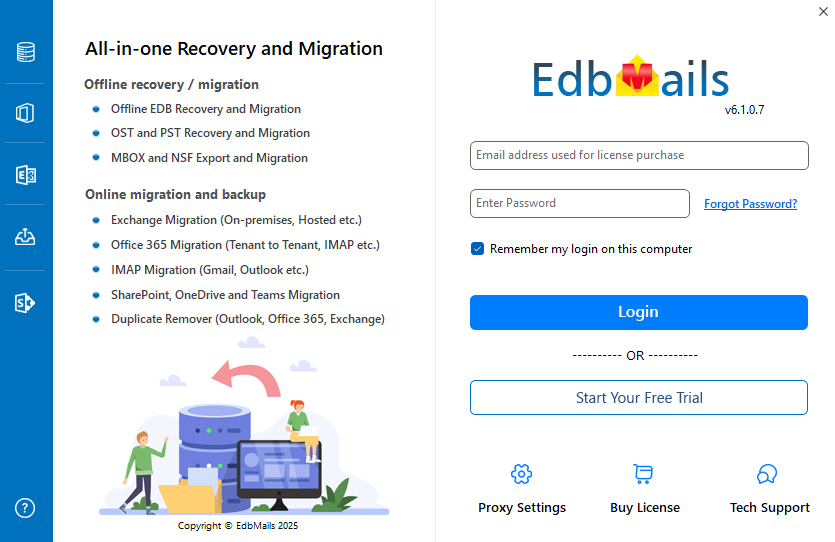
- Select IMAP Migration
- Choose the IMAP to Office 365 migration option.
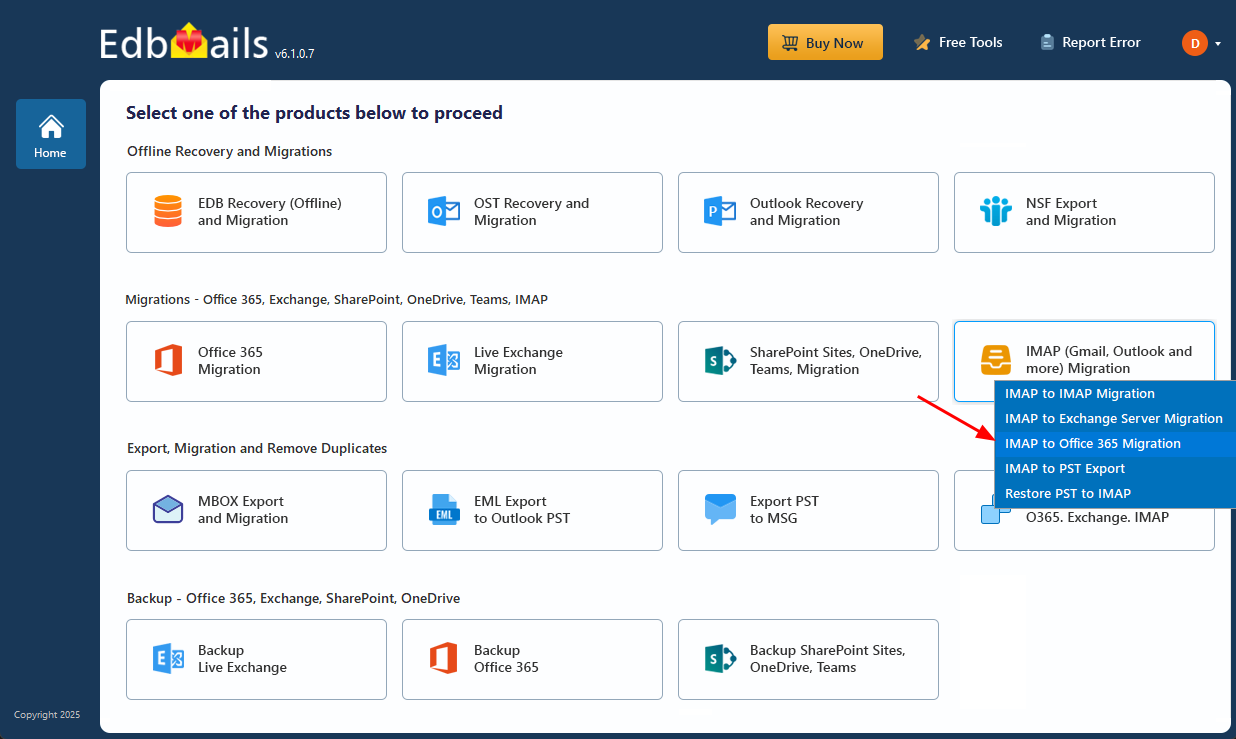
- Connect Zoho Mail (Source)
- Enter Zoho Mail login details and connect to the source server.
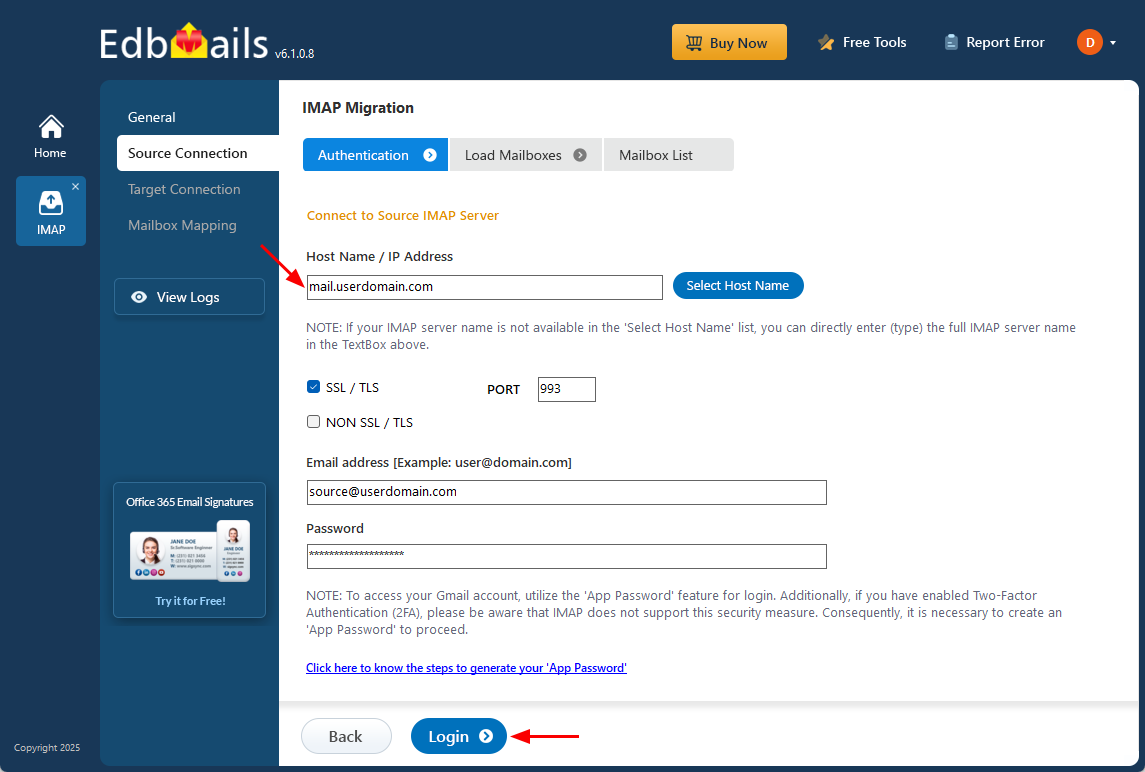
- Select Mailboxes/Folders
- Choose entire mailboxes or specific folders for migration.
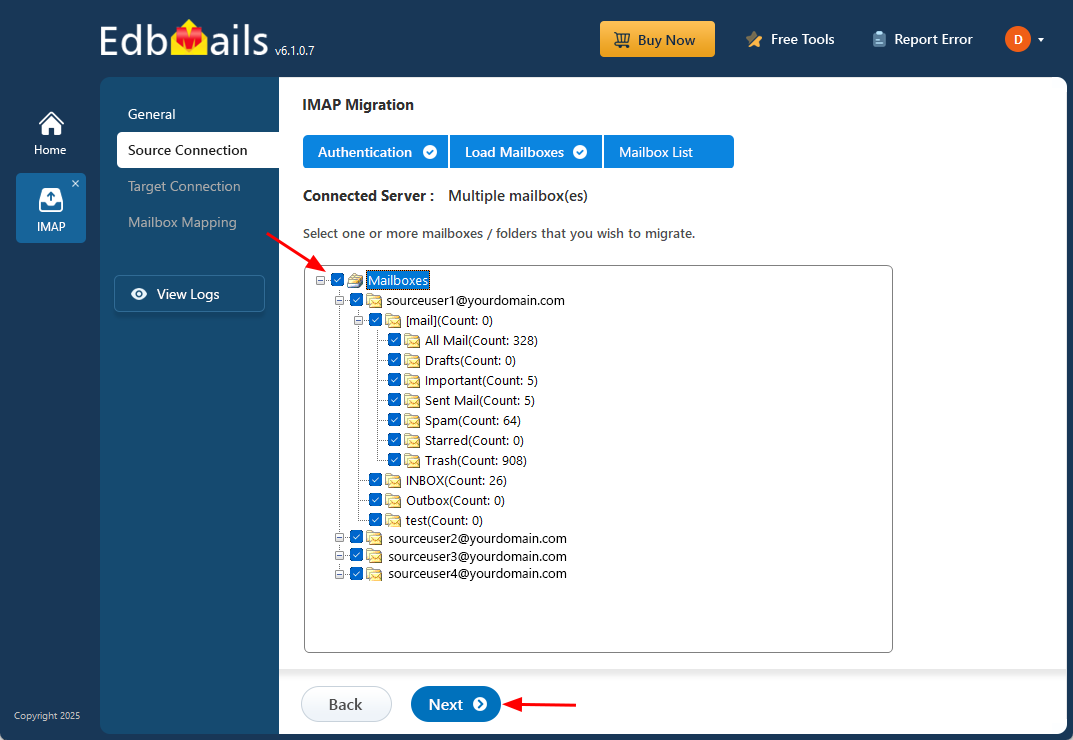
- Connect Office 365 (Target Server)
- Authenticate using modern login for Office 365.
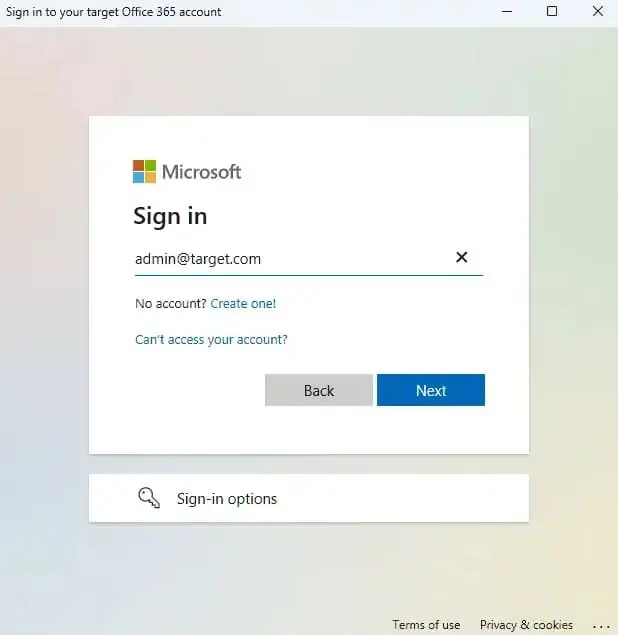
- Map Mailboxes
- EdbMails auto-maps source to target. Adjust manually if needed.
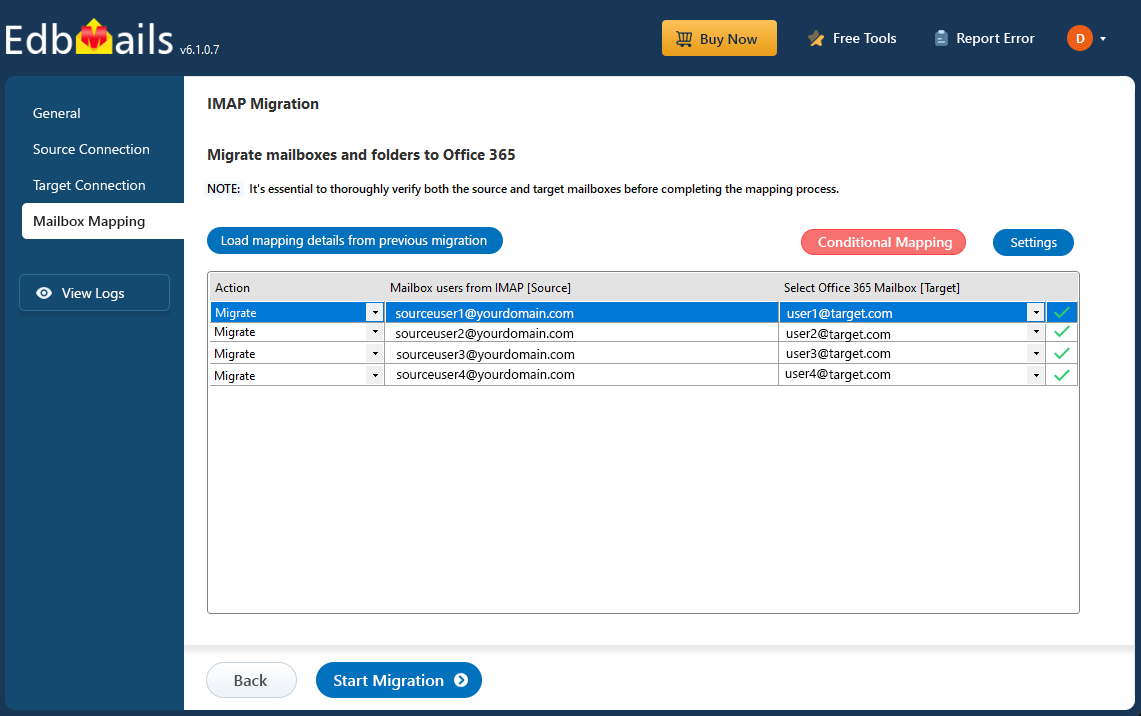
- Start Migration
- Begin the migration. Progress can be monitored in real-time.
- Verify and Report
- Check Office 365 mailboxes after migration.
For a More Detailed Step-by-Step Guide, Read:- Zoho Mail to Office 365 migration using EdbMails
Benefits of Using EdbMails for Zoho to Office 365 Migration
- Zero Downtime – Continue working while migration runs in the background.
- Scalability – Handles both single mailbox migrations and enterprise-wide projects.
- Security – End-to-end encryption with no data loss.
- Cost-Effective – Pay only for the licenses you need.
- 24/7 Support – EdbMails provides dedicated support for all customers.
- Free Trial – Test the migration before purchasing.
Conclusion
Migrating from Zoho Mail to Office 365 is no longer optional for organizations aiming for scalability, reliability, and enterprise-grade security. While Zoho Mail works well for small businesses, its limitations in handling large files, integration, and collaboration make it less suitable for growing companies.
Microsoft 365 (Office 365) offers a robust ecosystem of email, collaboration, and productivity apps that enhance organizational efficiency. The migration process, however, can be complex if attempted manually. That’s why EdbMails Zoho to Office 365 Migration Tool is the best choice. With its features like incremental migration, automatic mapping, and zero data loss, EdbMails ensures a seamless transition.

